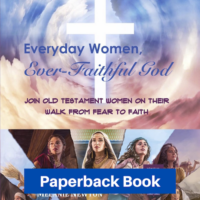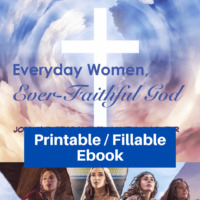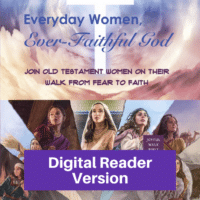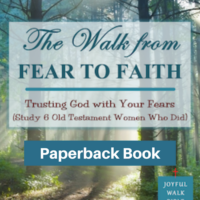Old Testament Women • Connecting their stories with trusting God today
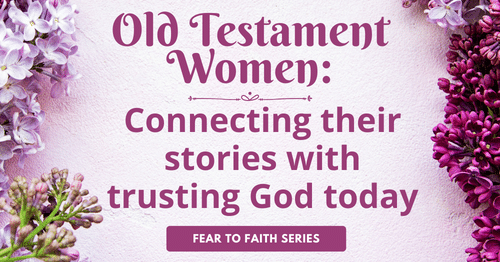
AI was not used to generate this post.
Do you look at the front half of your Bible and think that what is written in it happened so long ago that it could not possibly be relevant today? Even when you read about the Old Testament women, do you consider them as just names on a page? But recognize this: They were normal women, just like you and I are. Their stories are snippets of their biographies and have been preserved for us to get to know them. When you read their stories, you can see an ever-faithful God in action, a faithful God whose character never changes. God is as faithful now in your everyday circumstances of life as He was years ago to them. This is post #1 in the Fear to Faith series. In this post, we will look at the value of studying the lives of Old Testament women and connect their stories with how we can trust God today.
Key Takeaways
- The article emphasizes the relevance of the lives of Old Testament women and their relatable experiences.
- These women faced real-life challenges, emotions, and connections just like modern women do.
- Studying their stories reveals God’s faithfulness and provides inspiration for today’s readers.
- Understanding their lives helps us see our own stories reflected in theirs, fostering a deeper faith in God.
- The article encourages readers to trust in God’s character, showing that He remains faithful through all circumstances.
Listen to this post as a similar podcast from our Everyday Women, Ever-Faithful God Bible Study:
Getting to know someone from your past
Many Christians today have very little knowledge of the Old Testament. That might be your experience. Do you look at the front half of your Bible and think, “What’s written in it happened so long ago? What do those women and men have in common with me? They are just names on a page. They didn’t live in my world.” You are not alone in that assessment, but you are also missing out on what God wants you to know from His Word.
Do you ever read biographies? Doesn’t reading someone’s biography make that person come alive for you? It does for me. Or have you done genealogy work on your family tree? It can be great to find something to brag about. But you can also find out some of their dark secrets and hardships. I don’t know about you, but I feel a connection to that great-great grandmother when I learn a little bit about her life.
Years ago, I inherited from my aunt a wedding band with three diamonds mounted on top. I was told it was my grandmother’s wedding ring. The diamonds definitely are from her engagement ring. But when I examined the inside of the band, the engraved initials do not belong to my grandfather! Aha! There’s a story here.
After some research, it turns out that the wedding band itself belonged to my great-grandmother Anna. I have a picture of her and a little bit of her story. Suddenly I feel connected to her when I wear her ring—this woman who was dead long before I was born, even before my dad was born. She’s not a name on a page or just a subject in a photograph any longer. Anna was a woman who really lived.
I know Anna loved beauty and fashion because she worked in a hat shop. One day, she saw a young shoemaker walking by the window and declared, “That’s the man I’m going to marry.” And she did! That tells me she was decisive and determined. The initials engraved inside the ring next to hers are his. But he wasn’t my great-grandfather! Her first love died while she was pregnant with their first child. This tells me she experienced terrible grief. Four years later, she married his brother, a saloon keeper, who became my great grandfather. Their first child was my grandmother.
I know that Anna’s father died suddenly on Christmas Eve while she was fixing a Christmas basket for him. More grief! But it sounds like she had a servant’s heart.
The one picture I have of her tells me a little more about her disposition. At a time when picture taking was stiff and formal, Anna’s got a grin on her face. That makes me think she could be fun. I would love to know more of my great-grandmother’s story, especially her faith walk with God.
Connecting with Old Testament women
That brings me back to the lives of Old Testament women, to their biographies. Some of their names are familiar. You probably have heard or read about Sarah, Hannah, and Deborah. In fact, everyone of Jewish birth can consider Sarah to be a great-grandmother. The names Miriam and Abigail are also familiar even if you don’t know their stories. Then there are Rahab, Jael, and Jochebed. Some of the women whose stories are told are not even named. Have you heard about the Shunammite woman? Or Mrs. Manoah?
Maybe those Old Testament women lived years ago, but they were still women just like we are. They cooked meals, did laundry, and raised children. They had responsibilities inside and outside of their homes. Some even had home businesses. A couple of them could put together a banquet in a short time. They experienced hormone fluctuations, PMS, and menopause. They laughed with their kids, differed with their husbands, and cried when a loved one died. They wrote songs and played musical instruments. I bet they all found ways to use their 20,000 words per day!
At one time, they were 20-somethings, then 40-somethings, then 60-somethings and more. They wore beads, earrings, and bracelets. Their hair needed to be combed and fixed, and it turned grey as they aged. No doubt, some of them, if not all, had something on their bodies that sagged.
Those Old Testament women also experienced fear at various times in their lives just like we do. They had to face invading enemies, sick husbands and children, and empty pantries. They faced creditors and surprise house guests. They even had “bad” days when things didn’t go right, sometimes due to their own choices. Some were wise women; others were sometimes foolish in their choices and behavior.
A few of them had some interesting family relationships. For instance, Sarah’s son Isaac was also her nephew. Her sister-in-law was also her niece. One of my husband’s ancestors had a mother-in-law who was also his grandmother. I find that so funny.
Did you recognize any of your own life experiences in what I just shared? They were everyday women, just like you and I are. Their stories are just snippets of their biographies and have been preserved for us to get to know them. And through their stories, we get to know their God who is also our God.
Seeing an ever-faithful God in action through their stories
When you study their lives, you can see an ever-faithful God in action. The women of the Old Testament knew Him by the personal name Yhwh. In our English translations, that name is usually written as LORD in capital letters. Have you seen this in your Bible? That’s what it means. Over five hundred times in the Old Testament, you’ll find the phrase “the LORD your God” or “the LORD our God.” Every time you see it, that phrase is emphasizing, “We have a personal God. His name is Yhwh.” It’s the name by which God wished to be known and worshipped in Israel and by Israel. Yhwh means “I am.” This name expressed His character as constant, dependable and faithful.
Jesus applied God’s name “I AM” to Himself, when He said in John 8:59, “before Abraham was, I am.” Those listening knew He was declaring Himself to be God. So the ever-faithful promise-keeping God of the Old Testament is embodied in the Lord Jesus Christ of the New Testament and forever. We still have a personal God.
The value of studying the Old Testament
There is great value in studying the Old Testament. We are reminded about that value in Romans,
For everything that was written in the past was written to teach us, so that through the endurance taught in the Scriptures and the encouragement they provide we might have hope. May the God who gives endurance and encouragement give you the same attitude of mind toward each other that Christ Jesus had, so that with one mind and one voice you may glorify the God and Father of our Lord Jesus Christ. (Romans 15:4-6)
What was written in the past was written to teach us something. We learn from the endurance of the people who lived during that time. Their stories provide encouragement to us today so that we might have hope for our own lives. We can identify with them and what they experienced. It is God who gave them endurance and encouragement. He does the same for us today.
So when you look at the lives of the Old Testament women, you can see that they were ordinary females with the same emotions and tendencies to panic or make mistakes that we have. Yet, they learned to trust in God’s faithfulness and goodness through whatever life threw at them. Each one of those women had a story, and that story has been shared over and over to millions of eager listeners. You might be surprised how many times the Scriptures refer to them actually telling their story in one form or another. You will get to know it as you get to know them through reading about it. Just like I have gotten to know the original owner of my ring as I have learned some of my great-grandmother’s story. It’s a connection with real women, everyday women.
When you study their lives, you’ll see an ever-faithful God in action, a faithful God whose character never changes. God is as faithful now in your everyday circumstances of life as He was years ago to them, and as He was to my great-grandmother Anna. You can feel confidence in His presence and active involvement, even when you can’t see it. Knowing this, you can trust Him whenever you are facing any life situation. Trust is faith. Faith is confidence in God—His existence, His character, and His faithfulness to those who place themselves in His care.
You also have a story. When you recall parts of your story, write about it, and share it with others, that gives you more opportunity to praise your ever-faithful God as you see and hear how He has been faithful to you through the years.
And what about that woman who may one day call me “great-grandmother?” Because of all the parts of my story that’s written, my great-granddaughter will know more about me, just an everyday woman, and she’ll know more about the ever-faithful God I love and serve. She’ll know that I chose to trust God on my faith walk through life.
Why study women of the Bible?
Bible women were everyday women like we are today. Their stories-snippets of their biographies-are preserved for us to get to know them, and to know their God who is also our God-an ever-faithful God whose character never changes. We get to see how much our God loves us as women today.
Let Jesus satisfy your heart with His faithfulness and choose to trust Him with every fear.
Read all the articles in our Old Testament Women series. In the next post, we will learn four truths to walk from fear to faith in our lives.
All of the above information is covered in the Everyday Women Bible Study and the short and easy The Walk from Fear to Faith Bible Study.
-
Everyday Women, Ever-Faithful God (Old Testament Women)—paperback
$16.00 -
Everyday Women (Old Testament Women)—printable / fillable
$10.00 -
Everyday Women, Ever-Faithful God (Old Testament Women)—digital reader version
$4.99 -
The Walk from Fear to Faith (6 OT Women)—paperback
$14.00 -
The Walk from Fear to Faith (6 OT Women)—printable / fillable
$10.00 -
The Walk from Fear to Faith (6 OT Women)—digital reader version
$4.99
Image credit: sourced from a template at canva.com
AI was not used to generate this post.
